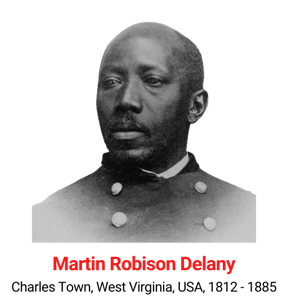

Martin Robison Delany (1812-1885) was born in Virginia; his father was enslaved while his mother was a free woman. Delany applied to Harvard Medical School at age thirty-eight and had applied to several medical schools. He was a student of Latin and Greek and a member of Pittsburgh's African Education, Antislavery, Temperate, Philanthropic, Moral Reform, and Young Men's Bible Societies. When Delany applied in person to Harvard Medical School, he had seventeen letters of recommendation from physicians in Pittsburgh and Allegheny, Pennsylvania, as well as three letters from clergymen, endorsing Delany's character and intelligence. After leaving Harvard Medical School, Delany went on to become a leader in several arenas, including abolition, reconstruction, and medicine. He was a physician, author, activist, and soldier and is considered by many to be the father of Black Nationalism. Delany died in 1885 in Wilberforce, Ohio.
Delany was also a pioneer of ethnography. In the 1860s, he traveled across the Niger River valley, where he visited and described various African territories and communities. In 1880, he published Principia of Ethnology: the origin of races and color, with an archaeological compendium of Ethiopian and Egyptian civilizations. In this work, Delany developed what could be called a "counter-ethnology," from which he proposed an original alternative to the race sciences of the 18-19th century.
Excerpt adapted from "Martin Robison Delany", in Perspectives of Change, Harvard University. Online
Further reading:
ADELEKE, T. (2003). Without regard to race: the other Martin Robison Delany. University Press of Mississippi. Ebook
LEVINE, R. (2003). Martin R. Delany: Documentary Reader. Chapel Hill, University of North Carolina Press. PDF
Main publications:
1847. Eulogy on the life and character of the Rev. Fayette Davis. Pittsburgh: Benj. Franklin Peterson.
1849. American Civilization: treatment of the Colored People in the United States. North Star, March 30.
1852/1998. The condition, elevation, emigration, and destiny of the Colored People of the United States. Baltimore: Black Classic Press. PDF
1855. Political aspect of the Colored People of the United States. Provincial Freeman, October 13.
1856. Political Event. Provincial Freeman, July 5.
1860/1969. Search for a place: Black separatism and Africa. Ann Arbor: University of Michigan Press. PDF
1861. Official Report of the Niger Valley Exploring Party. New York: Thomas Hamilton. PDF
1868. Political destiny of the Colored Race on the American Continent. In Life and Public Services of Martin R. Delany, ed. Frank Rollin. Boston: Lee and Shepard.
1870. Citizenship. National Era, March 10.
1870. Homes for Freedmen. Daily Republican, May 2.
1870. A series of four tracts on national polity. Charleston, S.C.: Republican Book and Job Office.
1871. A Political Review. Daily Republican, August 15.
1872. South Carolina Obligations. New York Times, September 25.
1872. South Carolina Obligations. New York Times, September 30.
1876. Trial and Conviction. Charleston.
1879/1991. Principia of Ethnology: the origins of the races and color. Baltimore: Black Classic Press. PDF
1970. Blake, or the huts of America (A corrected edition). Cambridge, MA: Harvard University Press. Ebook
